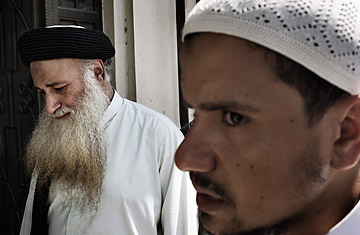
Mohamed Abdel Rahim al-Sharkawy spent 17 years behind bars in Egypt after being extradited from Pakistan in 1994. The fundamentalist Islamist was released from prison in March after numerous appeals from his family claiming his innocence.
(4 of 5)
Finally, he was handed to the Egyptians. It was the end of 2005, and he was delivered to an airport, along with four or five other Egyptians. Egyptian commanders beat them, he says, as they boarded an airplane where they were shackled to their seats, much in the way his father had been.
State security held him, blindfolded, for several weeks. "I was interrogated three times: which books do you read, do you pray, who do you know, whom of your father's friends do you know?" Sometimes, he could hear a woman crying nearby. There was ankle-deep water on the floor. For another week, he was chained to a wall next to what he suspected was an interrogation room. "I had to hear the screaming and crying of those who were being interrogated all night," he says.
Finally, his hypertension grew so bad, a prison doctor appealed for his release. State security relented and Abdel Rahman was freed in January 2006. But in 2008 the Interior Ministry was so fed up by the Sharkawy family petitions for better treatment of their head that, the family says, it struck out violently. Authorities arrested Abdel Rahman; and transferred Sharkawy to Al-Wadi Al-Jadid prison, Egypt's most notorious exile, deep in the southwestern desert. Abdel Rahman was tied naked to a bed and electrocuted repeatedly while detained for 21 days. "They didn't tell me they were releasing me," says Abdel Rahman. "they said they were transferring me to another prison for the rest of my life." he has no idea why they let him go. he was never given an explanation. 'Maybe just to teach me a lesson not to talk to human rights organizations."
Freedom at Last
By the end of the last decade, the older Sharkawy had come to believe that he would never be released. Some of the deprivations of prison life had eased slightly — if cynically. Prison guards would periodically sell cell phones to prisoners to use — only to then raid their cells and seize the items later.
Back in Cairo, Abdel Rahman had already filed the family's 17th appeal when Egyptians took to the streets protesting the regime's brutality and corruption on January 25th. He watched skeptically in the early days of protest, even as demonstrators called for an end to the emergency law that had kept his father incarcerated for so long. But by January 28th, the world outside the Sharkawy family's crumbling downtown apartment had turned into a war zone, and even Abdel Rahman grew to expect Mubarak's fall. And he did on Feb. 11. In March, Sharkawy became one of thousands of Islamists who the post-Mubarak military leadership set free in the wake of the regime's collapse.
Egypt has become a drastically different place since Sharkawy left on his pilgrimage to Saudi Arabia in 1988. "There is so much more traffic," he remembers of the day he got out of jail. "The changing of the regime was very strange. My father, my uncles — many of them have passed away while I've been gone." The family home — a dusty, sprawling apartment above an alley where vendors hawk spare car horns and sirens — is filled with new and unfamiliar faces. His siblings' children have grown up and had grandchildren. His elderly mother sits for long hours in a living room full of cats. His children — several of whom the family has managed to bring to Cairo from Pakistan in recent days — are all adults and a bit bashful as they try to relate to the father they can barely remember.
And yet, other things stay the same. Egypt's Emergency Law — the system that kept Sharkawy and many others behind bars — is still in place. Last week, the general prosecutor, a man appointed by Mubarak, referred a group of Muslims and Christians accused of inciting sectarian violence, to be tried before an emergency court — a process that would forever ban them from making appeals.
